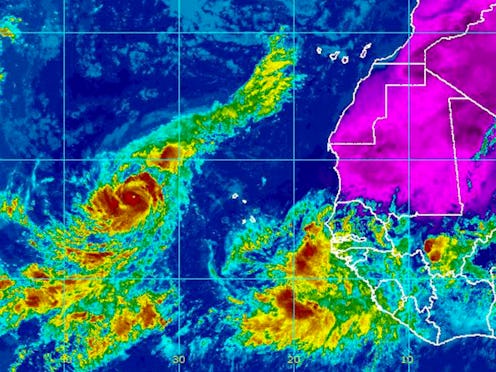News
Hurricane Irma Is Picking Up Strength This Weekend & It May Barrel Into The U.S.
After Hurricane Harvey devastated Southeastern Texas, it seems like another potential natural disaster may hit the United States in the form of Hurricane Irma. However, updates on Hurricane Irma show an uncertain path in spite of its intense strength. The formation of Irma reveals an interesting trajectory; the monstrous storm took shape on Wednesday morning off the coast of West Africa. Within 30 hours of its formation, Irma became a Category 3 hurricane. The National Hurricane Center calls this kind of swift increment in strength "rapid intensification." Meteorologist Philip Klotzbach noted that this is the first time in two decades that such an increase took place.
As of Saturday morning, Hurricane Irma has been listed as a "powerful" Category 2 storm. The National Hurricane Center described the storm as volatile and said that it "continues to fluctuate in strength but remains a powerful hurricane." According to weather forecasters, Irma's current placement is east of the Leeward Islands in the Caribbean.
According to the NHC, the hurricane shows possibility of moving toward the west over the next few days. As Weather Channel noted, Irma is presently experiencing an "eyewall replacement cycle" which involves the hurricane reorienting its eyewall or, in other words, the main point where the most severe weather conditions take place.
Irma has gained quite a reputation among meteorologists who have noticed how unique this hurricane is. For starters, CNN noted that Irma is a Cape Verde hurricane, which refers to a hurricane that took birth in the eastern parts of the Atlantic Ocean and gained rapid strength over the waters. Furthermore, Irma's timing is of particular interest to meteorologists. Evan Myers, a senior meteorologist from Accuweather told USA Today, "If Irma builds to a Category 4, and then hits the U.S. mainland, it will be the first time in more than 100 years the U.S. has been hit by two Category 4 hurricanes in the same year."
Although it is not confirmed whether Irma will make landfall in the United States, some forecasters believe that the hurricane may be headed toward the U.S. after Labor Day. Potential spots that could be affected include Florida and North Carolina but predictions on Irma have varied so far.
Given the destruction caused by Hurricane Harvey in Texas, it is only natural and entirely understandable for those living on America's East Coast and Gulf Coast to be worried and concerned for their safety. This is why forecasters and meteorologists have advised East Coast and Gulf Coast dwellers to keep their eyes peeled for updates on Irma.
